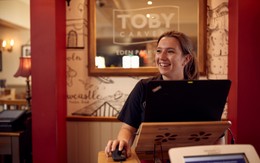21 December 2015
MITCHELLS & BUTLERS PLC
Annual Report 2015
In compliance with Listing Rule 9.6.1, Mitchells & Butlers plc has today submitted copies of the following documents to the National Storage Mechanism:
| 1. | Company Annual Report and Accounts 2015 |
| 2. | Notice of the 2016 Annual General Meeting |
The Company's Annual General Meeting will be held at Mitchells & Butlers plc, Retail Support Centre, 27 Fleet Street, Birmingham, B3 1JP on Thursday 28 January 2016 at 2.00pm.
Risks and uncertainties
This section highlights the principal risks and uncertainties that affect the Company, together with the key mitigating activities in place to manage those risks. This does not represent a comprehensive list of all of the risks that the Company faces, but focuses on those that are currently considered to be most relevant at the current time.
The processes that are used to identify and manage risks are described in the internal control and risk management statement on pages 47 and 48 of the 2015 Annual Report.
| Risk description | Mitigating activities |
| Market risks: Consumer taste and brand management | |
| Social and demographic changes are driving the long-term growth in eating-out while at the same time leading to a steady decline in the sales of on-trade drinks without food. These changes, together with other developments in consumer taste, may reduce the appeal of Mitchells & Butlers' brands to its guests, especially if the Company fails to anticipate and identify these changes and respond to them adequately and promptly. | |
| Pricing and market changes | |
| External influences, such as changes in the general economic climate or competitor activity, could have a detrimental effect on consumers' spending patterns and therefore the Company's revenue, profitability and consequently the value of its assets. | Mitchells & Butlers is focused on the long-term potential of the eating-out market. The Company owns sites across the UK with a wide spectrum of offers targeted at different consumer groups and leisure occasions. This range allows the Company to respond to changes in consumer expenditure either by flexing our offerings or by substituting a different brand at a particular location. This activity is supported by dedicated Sales and Margin Managers and Asset Planning teams which analyse and evaluate a range of information including that in respect of competitors. |
| Operational risks: Cost of goods price increases (including energy price increases) | |
| Increases in the price of goods for resale and utilities costs as a result of increases in global demand and uncertainty of supply in producing nations can have a significant impact on the cost base, consequently impacting margins. | |
| People planning and development | |
| Mitchells & Butlers has a strong guest focus, and as such it is important that it is able to attract, retain, develop and motivate the best people with the right capabilities throughout the organisation. There is a risk that without the right people our customer service levels would be affected. | |
| Business continuity and crisis management | |
| Mitchells & Butlers relies on its food and drink supply chain and the key IT systems underlying the business to serve its guests efficiently and effectively. Supply chain interruption, IT system failure or crises such as terrorist activity or the threat of disease pandemic might restrict sales or reduce operational effectiveness. | |
| Disaster Recovery and IT Resilience | |
| There is a risk that inadequate disaster recovery plans and processes are in place to mitigate against a system outage, or failure to ensure appropriate back-up facilities covering key business systems and the recovery of critical data. | In FY 2015 a detailed review of Disaster Recovery and IT Resilience was performed in order to highlight and address any challenges that had been presented in exploring the viability of a Disaster Recovery test for our business critical applications. Mitigating solutions have been critically assessed during the year. |
| National Living Wage | |
| There is a risk that increased costs associated with the introduction of the National Living Wage may adversely impact upon overall operational costs. | The National Living Wage will be introduced in April 2016 at £7.20 per hour, rising to at least £9.00 per hour in April 2020. A detailed review of the risks associated with successfully implementing the National Living Wage has therefore been completed. This review has been undertaken at a strategic level and seeks to ensure that appropriate mitigating actions are in place, some of which are in relation to how the Group carefully manages productivity and efficiency across the estate. Implementation of the National Living Wage will continue to remain an area of focus as we enter FY 2016. |
| Finance risks : Borrowing covenants | |
| The Company maintains headroom against these risks. The finance team conducts daily cash forecasting with periodic reviews at the Treasury Committee, the roles of which include ensuring that the Board Treasury Policy is adhered to, monitoring its operation and agreeing appropriate strategies for recommendation to the Board. In addition, regular forecasting and testing of covenant compliance is performed and frequent communication is maintained with the Securitisation Trustee. | |
| Pension fund deficit | |
| The material value of the pension fund deficit remains a risk. | The Company has made significant additional contributions to reduce the funding deficit. In May 2014, the Company reached agreement on the triennial valuation of the Group pension schemes as at 31 March 2013, at an increased funding shortfall of £572m (March 2010 valuation £400m). The value of total liability at the end of FY 2015, following the revised contributions, is £350m (FY 2014 £425m). |
| Regulatory risks : Failure to operate safely and legally | |
| A major health and safety failure could lead to illness, injury or loss of life or significant damage to the Company's or a brand's reputation. | Mitchells & Butlers maintains a robust programme of health and safety checks both within its restaurants and pubs and throughout the supply chain. The dedicated Safety Assurance team uses a number of technical partners including food technologists, microbiologists and allergen specialists to ensure that our food procedures are safe. Regular independent audits of trading sites are performed to ensure that procedures are followed and that appropriate standards are maintained. Food suppliers are required to meet the British Retail Consortium Global Standard for Food Safety and are subject to regular safety and quality audits. Comprehensive health and safety training programmes are in place. |
For further information, please contact:
Investor Relations
James Cooper
0121 498 4525
Media:
James Murgatroyd (Finsbury)
020 7251 3801





